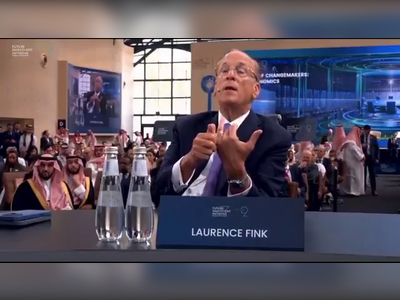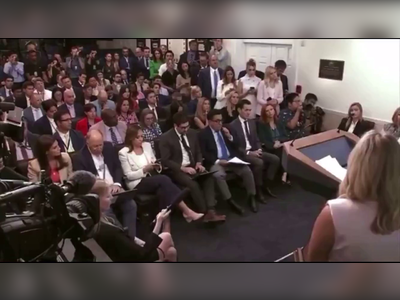
One month on: 9 things we’ve learned since Britain’s Tories went into meltdown
Blink and you might have missed it.
In just one month, Boris Johnson has gone from the top dog in British politics to yesterday’s man — and the bitter contest to succeed him is now in full flow, with Rishi Sunak and Liz Truss tearing chunks out of each other.
Johnson’s authority had been sapping away for months, but few would have predicted the speed with which the botched handling of a sexual harassment scandal at the end of June would call time on Johnson’s premiership, and kick off a ferocious fight for the future of the country. Here are nine things we’ve learned in a tumultuous, historic — and sometimes pretty confounding — month in British politics.
Johnson was not so Teflon after all
The received wisdom in Westminster had it that Johnson’s flaws — better at campaigning than governing, a chaotic personal life, and a looseness with the truth — were “priced in” by voters and Conservative MPs, part of the deal in picking a colorful leader who can connect with voters and push through big ideas.
Even this year, as Johnson’s government reeled from a scandal over boozy COVID rule-breaching parties, few pundits would have staked their reputations on the prime minister actually going any time soon. Indeed, Johnson himself was riling up his detractors less than six weeks ago by letting it be known he was already planning for a third term in office — despite not yet winning a second.
Yet months of disarray — including Partygate, a string of election losses, and the mounting cost of living hitting voters hard — had a cumulative effect, chipping away at the PM’s authority and allowing the Chris Pincher scandal (more in a moment) to deal the final blow.
In politics, it’s the cover-up that gets you every time
In purely political terms, the Pincher scandal looked survivable for Johnson. Accused of drunkenly groping two men at an event in West London, Deputy Chief Whip Pincher — a key ally of the prime minister — quit immediately.
Yet it’s what came next that really did it for Johnson. The prime minister, who had form in prevaricating over the fate of scandal-hit allies, initially declined to suspend Pincher from the Conservative Party.
It got worse. Downing Street repeatedly shifted its line on whether Johnson had been made aware of allegations against Pincher at the time he was promoted to the senior government enforcement role. A host of new allegations — all denied by Pincher — then emerged, while Johnson had to contend with the claim he’d made an off-color quip about a man he reportedly dubbed “Pincher by name, pincher by nature.”
What could have been a painful weekend for the government turned into a week-long scandal, derailing government announcements and spotlighting all of Johnson’s worst tendencies in the eyes of fed-up lawmakers.
Sexual misconduct by MPs is still a national scandal
The Pincher saga threw another grim aspect of Westminster life into sharp relief: sexual harassment and abuse remains rife in the corridors of power.
As claim after claim against Pincher was aired, staffers, trade unions and MPs themselves demanded fresh action to overhaul a culture that they warn keeps on letting down people who should be able to go to work without fearing for their safety.
Despite baby steps to better protect staff in recent years, the Pincher saga capped off an inglorious run. It came hard on the heels of two by-elections triggered by, in turn, an MP being convicted of sexually assaulting a 15-year-old, and a lawmaker resigning after being caught watching porn in the House of Commons chamber.
Tory MPs are ruthless as hell
In case you’ve lost count, the Conservatives are now searching for their fourth leader in just six years, having defenestrated David Cameron, Theresa May and now Johnson in rapid succession.
It’s long been held in Westminster that the Tories are much more efficient at dispatching underperforming leaders than the opposition Labour Party, which tends to hang on to a vote-loser until the public does the job for them at a general election.
Yet the vigor of the Conservative coup this time around has been something to behold — a record-breaking number of government resignations from the top to the bottom; wounding personal criticism of Johnson on the national airwaves; and a round of leadership contenders who can barely utter his name, all show that the party has lost none of its bloodlust.
Rishi Sunak and Liz Truss beware.
Leadership contests are crazily unpredictable
From frontrunner Ken Clarke dropping the ball in 2001 to Johnson torpedoing his own leadership bid in 2016, Conservative leadership contests have long been the scene of high drama.
But the first few weeks of the latest battle have been unpredictable even by Tory standards. Big names like Jeremy Hunt, Nadhim Zahawi and Sajid Javid all crashed out early after failing to gain real momentum, while long-shots Kemi Badenoch and Tom Tugendhat were elevated to kingmaker status after outperforming expectations.
Perhaps the most dramatic story arc of the race so far has been the meteoric rise and fall of Trade Minister Penny Mordaunt, who bowled over Conservative members and chased ex-Chancellor Sunak for the final two, only to be eclipsed by Foreign Secretary Liz Truss in the final stage of the campaign’s first round.
Policy still matters
Brexit hasn’t gone away, but this time around it feels a lot less important when it comes to wooing Conservative members.
Instead, Truss and Sunak are locked in a battle over the future of the British economy, with the pair trading blows over tax-and-spend, the cost of living, and the state of the country’s public services (when they’re not summoning Margaret Thatcher’s ghost to their side, or indulging in a bit of identity politics, of course.)
While both are avowed free-marketeers, Sunak and Truss’ economic plans do diverge sharply — showing that there’s still an ideological debate to be had inside the Conservatives that isn’t just about closeness or otherwise with the European Union.
TV debates can still be utterly compelling to watch
Political journalists would be forgiven for a collective eye-roll at the prospect of covering a summer of prime-time Conservative leadership debates — yet the result has been some genuinely fascinating television that’s helped illuminate the choice before Tory members.
From candidates being asked directly whether Johnson is an honest man to a debate moderator collapsing on set, the clashes haven’t been wanting for raw drama.
But they’ve also brought the candidates’ relative strengths and weaknesses to the fore, with Truss defying expectations in her first one-to-one match-up with Sunak, and the former chancellor’s reputation as a masterclass media performer taking its fair share of knocks. The camera does not lie.
‘He who wields the knife …’ is still a thing
It’s another one of the great British political cliches: “He who wields the knife never wears the crown.” The use of the phrase in Tory politics can be traced back to Michael Heseltine, the Cabinet big beast who quit Thatcher’s top team in the mid-1980s but failed to win over his party in the subsequent leadership election and thereby take the throne.
The Conservative party’s history since then shows that there is, in fact, plenty of room at the top for a knife-wielder (Johnson himself did plenty to kill off Theresa May’s government), but, on current polling, it looks like Sunak could well be headed down the Heseltine route.
Sunak played a decisive role in Johnson’s downfall, resigning in dramatic fashion alongside colleague Javid, who swiftly found his own leadership campaign floundering.
By contrast, frontrunner Truss has stayed publicly loyal, sticking to her day job as foreign secretary — and refusing to take aim at Johnson despite repeated opportunities to do so. It isn’t doing her any harm.
Everyone underestimated Liz Truss
Truss started late, underwhelmed at her campaign launch, fumbled a televised leadership debate, and came a distant third in the first round of voting among Tory MPs.
As her rival Mordaunt hoovered up backers, many in Westminster wondered if the gaffe-prone foreign secretary was out for the count — yet she’s now the overwhelming favorite to become Britain’s next prime minister. Shows what we all know.









